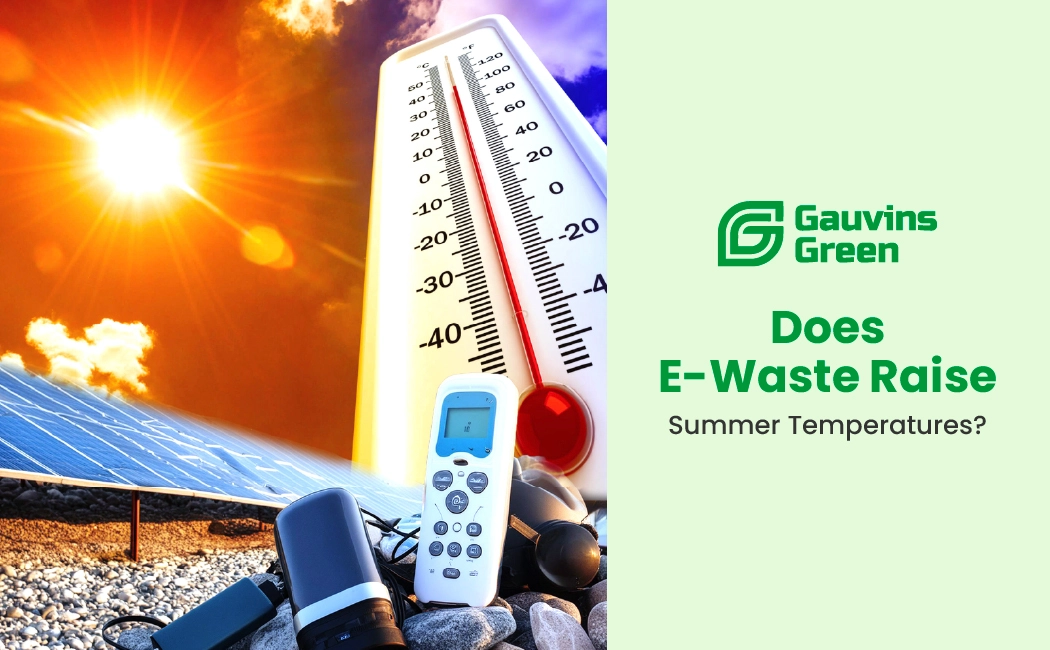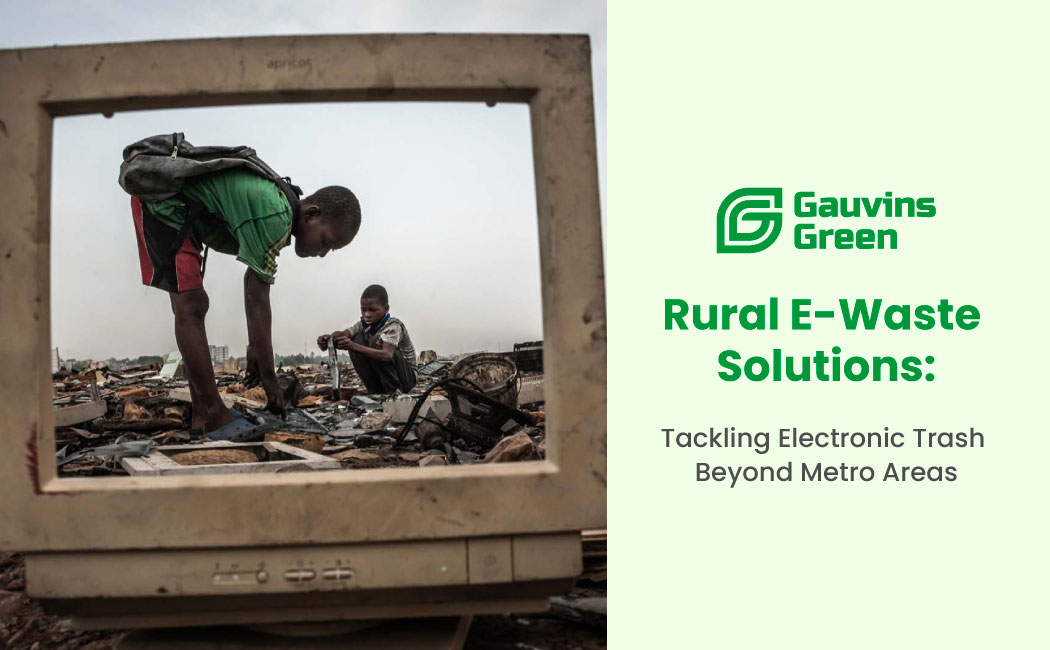|
Getting your Trinity Audio player ready...
|
As global temperatures continue to rise, the search for culprits extends beyond the usual suspects of fossil fuels and deforestation. One lesser-known contributor to climate change is electronic waste (e-waste). With the proliferation of electronic devices in our daily lives, the improper disposal of these gadgets has become a significant environmental concern. This blog explores the link between e-waste and climate change, examines its impact on rising summer temperatures, and highlights strategies for sustainable e-waste management, including the contributions of Gauvins Green.
Table of Contents
ToggleThe Link Between E-Waste and Climate Change
E-waste encompasses discarded electronic devices such as computers, smartphones, televisions, and household appliances. When these devices are improperly disposed of in landfills, they release harmful substances into the environment. Key components of electronic waste, including heavy metals like lead, mercury, and cadmium, and chemicals such as brominated flame retardants, pose significant risks to the ecosystem and human health.
Beyond their toxic contents, e-waste contributes to climate change in several ways. Firstly, the decomposition of e-waste in landfills produces methane, a potent greenhouse gas that is approximately 25 times more effective than carbon dioxide at trapping heat in the atmosphere. Additionally, the energy-intensive processes involved in manufacturing and recycling electronic devices contribute significantly to carbon emissions. The extraction of raw materials, production, and transportation all leave substantial carbon footprints. Thus, the improper handling of electronic waste exacerbates the problem of global warming.
The Impact of E-Waste on Summer Temperatures
The accumulation of e-waste and its contribution to greenhouse gas emissions have direct and indirect effects on summer temperatures. As greenhouse gases trap more heat in the atmosphere, global temperatures rise, leading to hotter and longer summers. This intensification of heat waves poses a severe threat to both natural ecosystems and human societies.
Urban areas, where electronic device usage is concentrated, often experience exacerbated effects. The urban heat island (UHI) effect, where cities become significantly warmer than their rural counterparts due to human activities, is intensified by the presence of electronic waste. Heat generated from electronic devices, combined with heat-absorbing infrastructure, creates hotspots that further elevate temperatures during the summer months.
Moreover, the improper disposal of electronic waste in open landfills or through incineration releases toxic pollutants into the air, contributing to poor air quality and respiratory problems. This issue is particularly pronounced during summer, when increased temperatures can lead to higher concentrations of ground-level ozone, exacerbating the health risks associated with air pollution.
Strategies for Sustainable E-Waste Management
To mitigate the environmental impact of e-waste and its contribution to rising summer temperatures, adopting sustainable electronic waste management practices is crucial. Here are several strategies to consider:
- Promote Recycling and Reuse: Encourage the recycling and reuse of electronic devices to reduce the need for new raw materials and decrease the volume of e-waste in landfills. Establish convenient electronic waste collection points and collaborate with certified recyclers.
- Implement Extended Producer Responsibility (EPR): Producers should be held accountable for the entire lifecycle of their products, including their disposal. EPR policies incentivize manufacturers to design products that are easier to recycle and to take back end-of-life products for proper disposal.
- Raise Consumer Awareness: Educate consumers about the environmental impact of e-waste and the importance of proper disposal. Campaigns and programs can inform the public about recycling options and the benefits of reducing electronic waste.
- Invest in Sustainable Technology: Support the development and adoption of sustainable technologies that use fewer hazardous materials and are more energy-efficient. Encourage innovations in recycling processes to recover valuable materials from electronic waste more effectively.
- Regulate and Monitor E-Waste Disposal: Governments should enforce stringent regulations on e-waste disposal and monitor compliance. Penalties for illegal dumping and incentives for proper recycling can drive better practices.
Gauvins Green Contribution
Gauvins Green leads in sustainable electronic waste management, offering electronic waste collection, recycling, and data destruction services. Their extensive recycling network collaborates with certified recyclers to recover valuable materials, reducing the need for new raw materials and minimizing carbon footprints. Gauvins Green also educates consumers and businesses on proper electronic waste disposal through campaigns and workshops. Supporting Extended Producer Responsibility (EPR) policies, they work with manufacturers to design recyclable products and encourage take-back programs, fostering a circular economy where electronics are reused, refurbished, and recycled, significantly lowering environmental impact.
Conclusion
E-waste contributes significantly to rising summer temperatures and global warming. Adopting sustainable electronic waste management practices, such as recycling, EPR policies, and consumer education, is crucial. Gauvins Green leads by example, promoting responsible e-waste disposal and recycling. Together, we can mitigate the environmental impact of electronic devices and work towards a cooler, greener future.
FAQs:-
What services are typically offered for electronic waste management?
Electronic waste management services generally include collection, recycling, and data destruction to ensure responsible disposal of electronic devices.
What services does Gauvins Green offer for e-waste management?
Gauvins Green provides e-waste collection, recycling, and data destruction services to ensure responsible disposal of electronic devices.
How does climate change affect summer temperatures?
Climate change leads to higher global temperatures, resulting in hotter and more frequent heatwaves during the summer months.
What is the link between e-waste and climate change?
Improper disposal of e-waste releases greenhouse gases like methane, contributing to global warming and climate change.
How do rising summer temperatures impact human health?
Increased summer temperatures can lead to heat-related illnesses such as heatstroke, dehydration, and respiratory problems.
Can electronic waste management help mitigate the effects of climate change?
Yes, proper electronic waste management reduces greenhouse gas emissions and environmental pollutants, helping to mitigate climate change.




